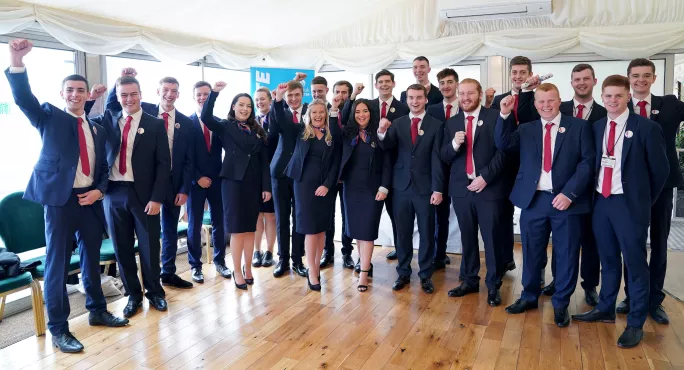
- Home
- ‘Competitive thinking can close the skills gap’
‘Competitive thinking can close the skills gap’

With less than a month until the start of EuroSkills Budapest 2018, the results from the latest Labour Productivity report makes for a sobering read. Although productivity slightly increased compared with the same quarter a year ago, the data still shows that it takes the UK five days to produce what Germany and France can do in four. And we know that higher skills in the UK are part of the solution to higher productivity.
So the UK’s ability to meet this productivity and skills challenge will come into sharp relief when Team UK members come face to face with their peer-competitors from across Europe and, in particular, France and Germany, at the competition in Hungary. We will be aiming for a medal-winning performance to match that at the most recent global competition in Abu Dhabi in October 2017, where we finished in the top 10 in the world rankings, ahead of Germany - again. This was an impressive result, suggesting that the “productivity puzzle” could be solved with some “competitive” thinking.
After all, for many years employers have been telling us that our skills competitions provide a form of accelerated development in which young people achieve greater technical excellence in their skills at European and world-class levels. The results of this were seen by Electroimpact, whose apprentice competed at the WorldSkills competition in Abu Dhabi. Following his training, the young competitor was able to complete a task three times faster, shaving 20 minutes off a two-hour machine cycle time. This meant savings in production time and manufacturing costs for the company and its customer Airbus. And that is productivity in a nutshell.
Transferable skills
However, this is only half the story. Through competing, apprentices and students also develop transferable skills, including resilience under pressure, creative thinking and effective leadership. This is particularly valuable when you consider the CBI/Pearson 2017 survey, in which 86 per cent of employers stated that they believed attitude towards work to be of greater importance than general academic ability. This view was further confirmed at a recent roundtable we held, which brought together leading employers in the engineering industry with representatives from the skills sector and government officials. Siemens, with whom we partner to deliver our regional and national skill competition in industrial control, explained that it believed that while skills are important, mindset and character traits are becoming more and more important for the future of work.
So taking part in skills competitions is key to developing the right skill set and mindset in the interests of the UK economy. With Brexit now only months away, we need to benchmark our young people’s skills against the best of the rest of the EU.
It’s only through putting our young people to the test in a time-pressured environment against the highest of specifications that we’ll know whether we are developing the skills levels we need in the UK to boost productivity, compete economically and attract inward investment to help create jobs into the future. And it’s through investing in our young people that we will grow these skills to the advanced levels we need. At WorldSkills UK, it’s our responsibility to help bring what has been learned back into the UK skills system so that more young people and businesses can benefit from the productivity insights we gain.
New skills competitions
That’s why we have been developing a programme to convene employers, skills partners and public policy officials to talk about skills, technology and productivity in the engineering and construction sectors over the past few months. The next stage of this programme will take place at WorldSkills UK LIVE in November, when we will begin to look at international productivity insights. This is all in order to help provide insights into some of the learning we gain from our international experience and embed these back into the UK skills system to benefit more young people and their employers.
Further, to keep pace with the changing needs of the UK economy, and in line with the UK industrial strategy, we have introduced new skills competitions into our UK portfolio. These include cyber security, digital rail technician, lab technician and cloud computing. Sitting alongside our core skills competitions, these new competitions will ensure that we are helping employers to develop the right blend of technical skills and mindset that will meet the existing and future needs of large, medium and small businesses. We are working with WorldSkills International to introduce these new skill competitions at European and global levels. This is crucial to ensure that these competitions can help to drive performance at ever higher standards - key to improving productivity levels.
As Team UK members get ready to deliver the performance of their lifetime, I am confident that EuroSkills Budapest 2018 can help to show that, as we prepare to leave the European Union, the UK has got the skills to succeed - and help solve our productivity puzzle, too.
Dr Neil Bentley is chief executive of WorldSkills UK. To keep up to date with Team UK, follow @worldskillsuk on Twitter
Register with Tes and you can read five free articles every month, plus you'll have access to our range of award-winning newsletters.
Keep reading for just £4.90 per month
You've reached your limit of free articles this month. Subscribe for £4.90 per month for three months and get:
- Unlimited access to all Tes magazine content
- Exclusive subscriber-only stories
- Award-winning email newsletters
You've reached your limit of free articles this month. Subscribe for £4.90 per month for three months and get:
- Unlimited access to all Tes magazine content
- Exclusive subscriber-only stories
- Award-winning email newsletters



